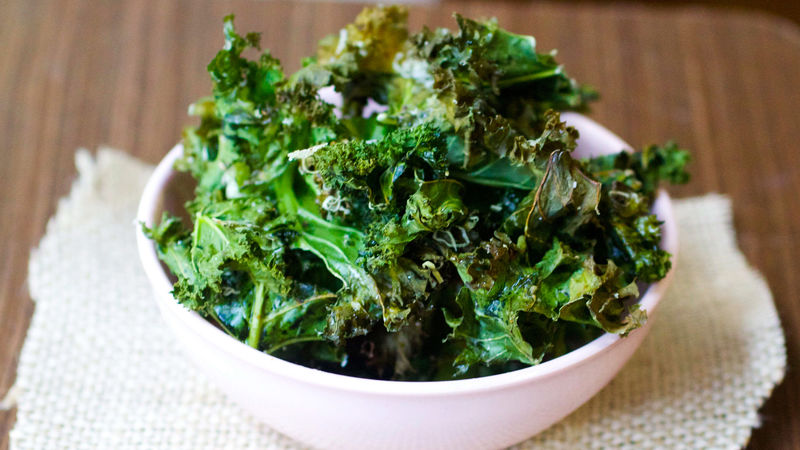Here is a recipe for some amazing Kale Chips.
PROCESS
Prep Time: 10 Minutes
Cook Time: 10 Minutes
Ready In: 20 Minutes
Servings: 6
“Olive oil and seasoned salt are all you need to turn fresh kale leaves into delicious good-for-you baked snacks.”
INGREDIENTS:
1 bunch kale
1 tablespoon olive oil 1 teaspoon seasoned salt
DIRECTIONS:
1. Preheat an oven to 350 degrees F (175 degrees C). Line a noninsulated cookie sheet with parchment paper.
2. With a knife or kitchen shears carefully remove the leaves from the thick stems and tear into bite-size pieces. Wash and thoroughly dry kale with a salad spinner. Drizzle kale with olive oil and sprinkle with seasoning salt.
3. Bake until the edges brown but are not burnt, 10 to 15 minutes.
NUTRITIONAL INFORMATION
Calories, Carbohydrates, and Fiber
Each serving of baked kale chips contains just 50 calories or 2.5 percent of a typical 2,000-calorie daily intake. You also get 10 grams of carbohydrates with each serving of baked kale chips. An average daily intake of carbohydrates is around 225 grams. As a bonus, baked kale chips contain 2 grams of dietary fiber. Fiber is difficult for your body to break down, prolonging the sensation of fullness for as much as two hours and promoting healthy digestion.
Protein, Fat, and Cholesterol
The protein content of baked kale chips is 3 grams per serving. A healthy adult female should consume around 46 grams of protein per day and a healthy adult male around 56 grams of protein per day. Each helping of baked kale chips also contains 1 gram of fat, 0.1 of which is saturated, and no cholesterol. A healthy adult should consume around 44 grams of fat, including no more than 16 grams of saturated fat, and 300 milligrams of cholesterol.
Vitamins and Minerals
Kale chips shine nutritionally, packing 2 milligrams of iron, 447 milligrams of potassium and 769 micro milligrams of vitamin A in each serving. The iron content helps keep your blood — and thus your body — oxygenated with 25 percent of an average man’s 8-milligram daily intake and 11 percent of an average woman’s 18-milligram daily intake. Potassium helps keep your immune system healthy. The vitamin A content is not quite as high, considering men need around 3,000 milligrams and women 2,310, but it contributes to healthy skin, eyes, and bones. You also consume trace amounts of calcium, magnesium, phosphorus, vitamin C, and vitamin K. As a bonus, each serving contains just 43 milligrams of sodium — that is less than 2 percent of a heart-healthy 2,300-milligram limit.
